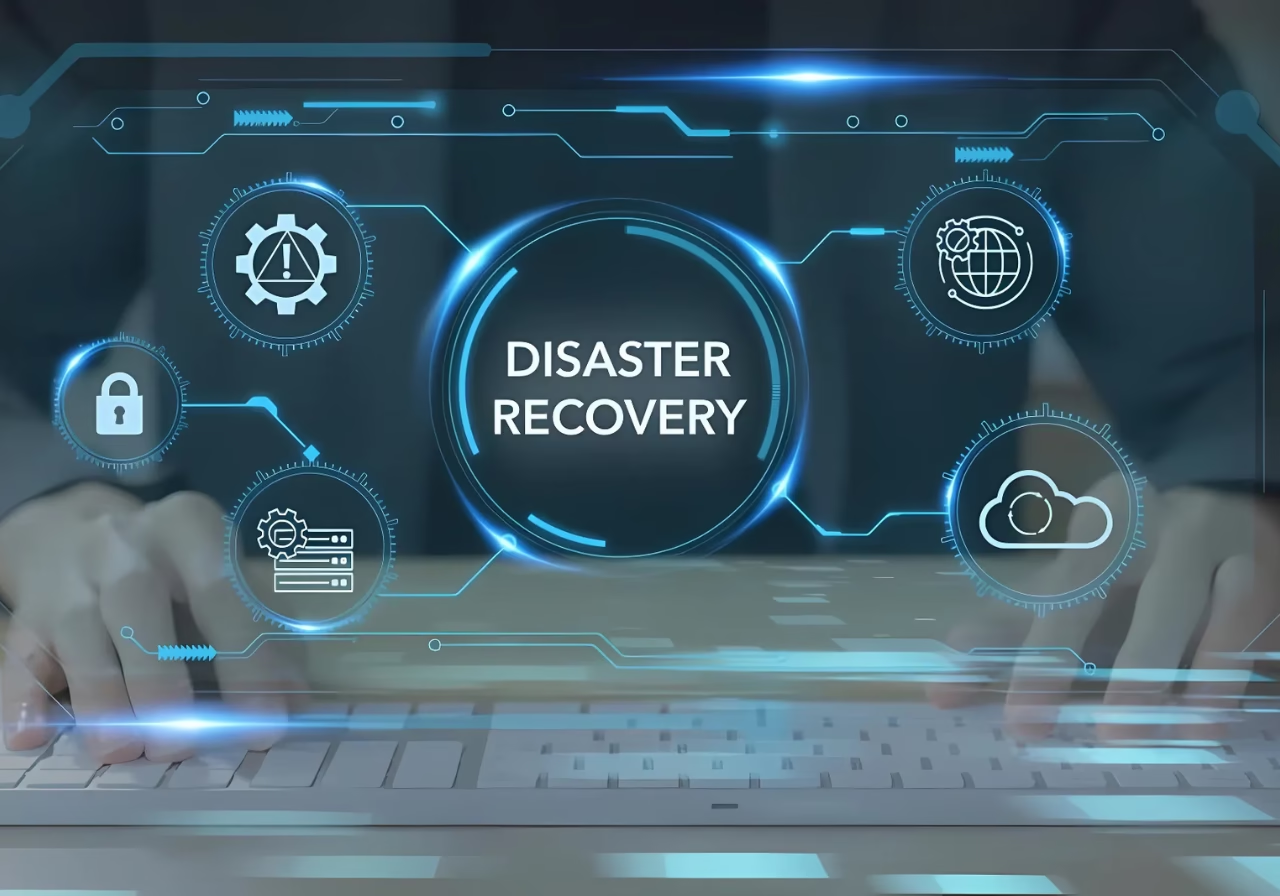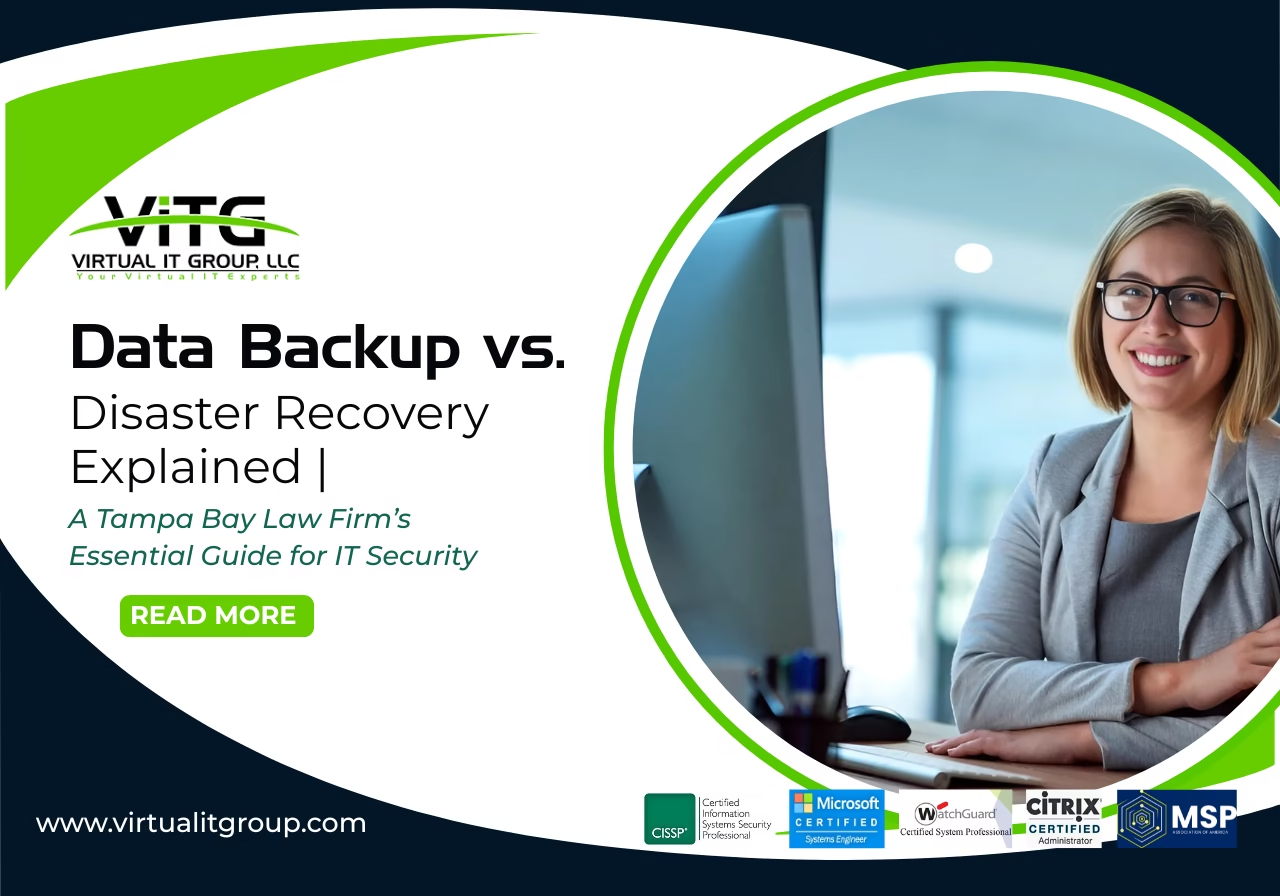Data Backup vs. Disaster Recovery is a crucial distinction that law firms in Tampa Bay must understand to safeguard their operations. As law firms rely increasingly on digital platforms to manage cases, store sensitive client information, and communicate with clients, protecting that data becomes essential. Both data backup and disaster recovery strategies are designed to protect law firms from the significant risks posed by cyber threats, hardware failures, and natural disasters, but they do so in different ways.
Understanding how to implement both solutions will ensure that your firm maintains business continuity during times of disruption. With increasing threats from cyberattacks, especially in the legal industry, knowing the best practices for both data backup and disaster recovery is essential for every Tampa Bay law firm. In this article we will outline deeper into the differences between these two strategies, why law firms require both, and best practices for implementing them in your IT security plan.
Table of Contents
- Why Data Backup vs. Disaster Recovery Matters for Law Firms in Tampa Bay
- What is Data Backup?
- What is Disaster Recovery?
- The Key Differences Between Data Backup and Disaster Recovery
- Scope, Timeframe, and Purpose
- Why Law Firms Require Both Data Backup and Disaster Recovery
- How Data Backup vs. Disaster Recovery Protects Your Law Firm
- Protection Against Cyber Threats: Ransomware, Malware, and Data Breaches
- Best Practices for Data Backup and Disaster Recovery for Law Firms
- How ViTG Helps with Data Backup and Disaster Recovery for Law Firms
- 24/7 IT Monitoring to Prevent Disruptions and Ensure Data Availability
- Proactive Security Measures to Safeguard Your Firm from Cyber Threats
- Personalized Disaster Recovery Plans: Ensuring Minimal Downtime
- Secure Cloud-Based Backup Solutions for Law Firms
- Seamless Cloud Solutions for Enhanced Productivity and Collaboration
- Automated Data Backup & Recovery Solutions
- Cloud Security for Law Firms: Advanced Protection for Sensitive Data
- Continuous IT Support for Law Firms
- Conclusion
- Frequently Asked Questions (FAQs)

Data Backup vs. Disaster Recovery Explained: A Tampa Bay Law Firm’s 2025 Essential Guide for IT Security
Why Data Backup vs. Disaster Recovery Matters for Law Firms
For law firms in Tampa Bay, data backup and disaster recovery strategies are essential for maintaining business continuity. With an increasing reliance on digital tools to store sensitive client information, manage legal records, and streamline communication, ensuring that this data is protected is vital. Data breaches, system failures, and cyberattacks can disrupt operations and potentially damage a law firm’s reputation, which is why understanding the difference between data backup vs. disaster recovery is crucial.
Both data backup and disaster recovery aim to protect your law firm’s data and IT infrastructure, but they serve distinct purposes. Data backup ensures that copies of your critical data are securely stored, while disaster recovery ensures your law firm can recover quickly and resume operations in the event of a significant IT disaster.
What is Data Backup?
Data backup is the process of creating copies of important data, such as legal documents, client files, and financial records, and storing these copies in a secure location. The goal is to have an accessible copy of your data that can be restored in the event of data loss, system failure, or cyberattack.
There are several types of backups:
- Full Backup: A complete copy of all your data. It’s often used for initial backups or for periodic full system backup.
- Incremental Backup: Only the data that has changed since the last backup is copied, which reduces storage requirements and speeds up the backup process.
- Differential Backup: This includes all changes since the last full backup, striking a balance between full and incremental backups.
In a law firm, the most critical data to back up includes:
- Client records and case files
- Emails and communication with clients
- Billing and financial data
- Legal research and documents
By regularly backing up this data, law firms ensure that if data is lost or compromised, they can quickly restore it and continue operations with minimal downtime.
Best Practices for Data Backup:
- Daily or Weekly Backups: Law firms should establish a routine for backing up data based on its importance and sensitivity.
- Cloud-Based Backups: Cloud solutions offer scalable storage options and easy remote access for law firms.
- Offsite Backups: Storing backup data in a secure, offsite location (or in the cloud) provides protection against physical disasters like fires or floods.
What is Disaster Recovery?
Disaster recovery (DR) is the process of restoring your IT infrastructure, systems, and applications after a disaster or significant disruption. While data backup focuses primarily on protecting data, disaster recovery ensures that your law firm can restore full operations, including servers, network infrastructure, and applications, after a failure.
Disaster recovery is not just about recovering data—it’s about recovering your entire IT system and getting your law firm back to business as quickly as possible. A well-designed disaster recovery plan (DRP) outlines all the steps necessary to restore operations, including identifying critical systems, determining recovery priorities, and establishing timelines for recovery.
Key aspects of disaster recovery include:
- Recovery Time Objective (RTO): The amount of time it takes to restore your systems and resume operations after an incident.
- Recovery Point Objective (RPO): The maximum acceptable amount of data loss, which helps determine how often backups should be performed.
Best Practices for Disaster Recovery:
- Cloud-Based Disaster Recovery: Many law firms use cloud-based DR solutions because they are cost-effective and scalable.
- Regular DR Drills: Conduct periodic tests of your disaster recovery plan to ensure that it works as expected.
- Documented Recovery Procedures: Your disaster recovery plan should be well-documented and accessible to your IT team for quick implementation during an emergency.

Data Backup vs. Disaster Recovery Explained: A Tampa Bay Law Firm’s 2025 Essential Guide for IT Security
The Differences Between Data Backup and Disaster Recovery
While data backup and disaster recovery are both designed to protect your law firm’s data, they serve different purposes:
- Data Backup focuses on creating secure copies of critical data to ensure that if data is lost, it can be quickly restored.
- Disaster Recovery focuses on restoring your entire IT infrastructure and operations, allowing your law firm to resume business functions as quickly as possible.
Key differences:
- Scope: Data backup is about preserving data, while disaster recovery is about full system restoration.
- Timeframe: Backups can typically be restored quickly, while disaster recovery may take longer as it involves restoring entire systems.
- Purpose: Data backup ensures that your data is intact and accessible, while disaster recovery ensures business operations continue after a disruption.
Why Law Firms Need Both Data Backup and Disaster Recovery
Law firms in Tampa Bay are especially vulnerable to cyberattacks, such as ransomware, phishing, and data breaches, which can compromise sensitive client information and disrupt operations. Without a solid data backup vs. disaster recovery strategy, your firm could face significant challenges, including:
- Loss of client trust: A data breach or prolonged downtime could lead to reputational damage and loss of clients.
- Regulatory penalties: Law firms are often required to comply with regulations like HIPAA and GDPR, which mandate the protection of client data and the ability to recover it in the event of a breach.
- Financial losses: Cyberattacks or system failures can lead to lost revenue due to downtime, legal penalties, and recovery costs.
By implementing both data backup and disaster recovery, law firms ensure that they can:
- Recover lost data quickly through backups.
- Restore full IT functionality and resume business operations with minimal disruption.
- Protect sensitive client data and comply with legal and regulatory requirements.
How Data Backup vs. Disaster Recovery Protects Your Law Firm
Cybersecurity threats are an ever-growing risk for law firms. Common threats such as ransomware and data breaches can disrupt operations and compromise sensitive information. Here’s how data backup and disaster recovery protect your law firm:
- Ransomware: With a solid data backup strategy, your firm can recover critical files without having to pay a ransom. Disaster recovery ensures that your systems are fully restored to their previous state.
- Malware: Regular data backup ensures that you can recover files even if malware causes data corruption. Disaster recovery helps restore the entire network and IT infrastructure.
- Data Breach: Both data backup and disaster recovery are essential for mitigating the effects of data breaches. Backups allow you to recover stolen data, while disaster recovery ensures that your systems are restored to full functionality.

Cloud-Based Data Backup vs. Disaster Recovery for Law Firms: Secure solutions for continuous operations.
Best Practices for Data Backup and Disaster Recovery for Law
To ensure your law firm is well-prepared, it’s essential to follow best practices for both data backup and disaster recovery:
- Conduct regular backups: Schedule automated backups to ensure your data is always protected.
- Test your disaster recovery plan: Regularly test your recovery plan to ensure that it works during a disaster.
- Use cloud-based solutions: Cloud storage offers scalability, security, and quick recovery for law firms.
- Implement encryption: Ensure all sensitive data is encrypted both at rest and during transit.
- Employee training: Ensure that employees are trained on the importance of data security and how to recognize threats like phishing.
How ViTG Helps with Data Backup and Disaster Recovery
Data Backup vs. Disaster Recovery is important for law firms that handle sensitive client data and require seamless operations, even during unforeseen disruptions. At Virtual IT Group (ViTG), we specialize in providing comprehensive IT support for law firms in Tampa Bay, ensuring that both data backup and disaster recovery are seamlessly integrated into your law firm’s operations. Here’s how ViTG can help:
1. 24/7 IT Monitoring to Prevent Disruptions and Ensure Data Availability
Ensuring business continuity for law firms starts with 24/7 IT monitoring. ViTG’s round-the-clock monitoring allows for early detection of any issues, ensuring that disruptions are minimized before they affect your firm’s operations. Whether it’s cyber threats or hardware failures, we act swiftly to resolve problems, ensuring your law firm continues running without delay.
Why 24/7 IT Monitoring is Important for Law Firms:
- Immediate Issue Detection: Early identification of potential issues helps avoid costly downtime.
- Seamless Operations: Ongoing monitoring means your systems run efficiently without interruptions, allowing you to focus on serving clients.
- Protection Against Cyber Threats: Continuous surveillance helps mitigate the risks posed by external threats such as ransomware and phishing attacks.
2. Proactive Security Measures to Safeguard Your Firm from Cyber Threats
As law firms handle confidential client data, they are prime targets for cybercriminals. ViTG’s proactive security measures defend against cybersecurity threats like ransomware, phishing, and malware. We focus on securing your firm’s data with a comprehensive security framework, protecting your sensitive files and ensuring business continuity.
Key Security Measures Provided by ViTG:
- Next-Gen Firewalls: Shield your firm’s network from unauthorized access and malware.
- Data Encryption: Encrypt sensitive data both at rest and in transit to ensure it remains secure, even if intercepted.
- Multi-Factor Authentication (MFA): Add an extra layer of protection to ensure only authorized users can access sensitive data.
- Threat Detection Tools: Real-time monitoring and advanced threat detection technologies ensure immediate identification and resolution of cybersecurity issues.

Data Backup vs. Disaster Recovery Explained: A Tampa Bay Law Firm’s 2025 Essential Guide for IT Security
3. Personalized Disaster Recovery Plans: Ensuring Minimal Downtime
When disaster strikes, law firms demand a well-defined disaster recovery plan (DRP) to ensure data can be quickly restored and operations can resume with minimal downtime. ViTG helps law firms develop personalized disaster recovery strategies that are aligned with the unique requirements of your practice. We help create and implement comprehensive recovery plans so that your firm can recover swiftly in the event of an unforeseen incident.
How ViTG’s Disaster Recovery Plans Protect Your Law Firm:
- Rapid Data Restoration: In the event of a disaster, we prioritize restoring your data and systems as quickly as possible.
- Redundancy and Failover Systems: We use redundant systems to minimize downtime and ensure your firm’s operations continue, even during technical failures.
- Customized Disaster Recovery Strategies: Our team works closely with you to develop a DRP that ensures business continuity, customized to your firm’s workflow and IT infrastructure.
4. Secure Cloud-Based Backup Solutions for Law Firms
Law firms generate large amounts of critical data that must be backed up securely. ViTG offers cloud-based backup solutions to ensure that your firm’s data is continuously protected and readily available. Cloud backups are stored offsite and offer a secure, scalable solution for data protection.
Benefits of ViTG’s Cloud-Based Backup Solutions:
- Offsite Backups: Data stored offsite in secure cloud environments ensures protection from local disasters such as fires or theft.
- Scalable Solutions: As your law firm grows, your data storage requires increase. Cloud backup solutions easily scale to accommodate your expanding data.
- Automated Backups: Automated cloud backups ensure your firm’s critical data is continuously backed up without requiring manual intervention.
- Secure Data Accessibility: Cloud backups allow for easy retrieval of critical files and documents, ensuring rapid recovery if required.
5. Seamless Cloud Solutions for Enhanced Productivity and Collaboration
Cloud-based solutions are a game-changer for law firms in Tampa Bay, allowing teams to collaborate efficiently, access critical data remotely, and ensure business continuity. ViTG provides law firms with cloud services that support real-time collaboration and secure file sharing, ensuring smooth operations, whether working from the office or remotely.
How ViTG’s Cloud Solutions Improve Law Firm Productivity:
- Remote Access to Files: Cloud-based solutions provide instant access to case files, legal documents, and client records from anywhere, at any time.
- Collaboration Tools: Tools like Microsoft Teams, OneDrive, and Procore enable your team to work together seamlessly, regardless of location.
- Data Synchronization: Cloud solutions synchronize data across devices and locations, ensuring that all users have access to up-to-date information.

Data Backup vs. Disaster Recovery Explained: A Tampa Bay Law Firm’s 2025 Essential Guide for IT Security
6. Automated Data Backup & Recovery Solutions
Law firms cannot afford to wait for data recovery after an incident. ViTG’s automated data backup systems ensure that your firm’s critical data is consistently and securely backed up, with minimal risk of data loss. In case of a disaster, automated recovery systems help your law firm get back on track quickly and efficiently.
Key Benefits of ViTG’s Automated Backup & Recovery:
- Faster Recovery Times: Automated backups reduce the time it takes to restore your law firm’s data, getting your operations back online faster.
- Consistent Data Protection: Automated backups ensure that your data is always up to date and ready for recovery at any moment.
- Reduced Human Error: By automating the backup process, the risk of human error is minimized, ensuring that your data is protected at all times.
7. Cloud Security for Law Firms: Advanced Protection for Sensitive Data
In the digital age, ensuring the security of your firm’s data is paramount. ViTG’s cloud security solutions provide enhanced protection for your critical client information, case files, and business records. We utilize cutting-edge cloud security technologies to safeguard your firm from threats, including data breaches and cyberattacks.
Cloud Security Features ViTG Provides for Law Firms:
- Encryption: We ensure that all data stored in the cloud is encrypted, making it unreadable to unauthorized users.
- Access Control: Our cloud security solutions include robust access control mechanisms, ensuring that only authorized personnel have access to sensitive information.
- 24/7 Cloud Monitoring: We continuously monitor your cloud environment to detect any suspicious activity or security breaches.
8. Continuous IT Support for Law Firms
ViTG’s managed IT services provide ongoing support for law firms, ensuring that IT systems remain operational, secure, and up-to-date. With 24/7 IT support, your firm can rely on our team of experts to address any issues that arise, ensuring minimal disruption to your operations.
How ViTG’s Ongoing Support Benefits Law Firms:
- 24/7 IT Support: Our team is always available to resolve any IT issues that may arise, ensuring that your systems are continuously running without interruptions.
- Regular Maintenance: We provide regular updates and maintenance to ensure that your IT infrastructure is running optimally.
- Fast Response Times: When problems occur, our team acts quickly to resolve issues, reducing downtime and minimizing disruptions to your law firm’s workflow.

Data Backup vs. Disaster Recovery Explained: A Tampa Bay Law Firm’s 2025 Essential Guide for IT Security
Conclusion
Understanding the difference between data backup and disaster recovery is essential for maintaining business continuity. For law firms in Tampa Bay, having reliable, robust systems in place to protect critical data and quickly recover from unforeseen events is no longer optional it’s a necessity.
With ViTG, your law firm gains access to expert-managed IT services, including continuous data backup, comprehensive disaster recovery strategies, and cutting-edge cybersecurity solutions. Our proactive approach ensures that your firm’s data is always protected, secure, and easily recoverable, minimizing downtime and protecting both your reputation and client confidence.
Don’t wait until a crisis occurs. Schedule FREE 30-minute consultation today or visit our website and let us help your future-proof your law firm’s IT infrastructure for long-term success.
Frequently Asked Questions (FAQs)
What is the difference between data backup and disaster recovery?
Data Backup vs. Disaster Recovery are two distinct strategies that both aim to protect your law firm’s data. Data backup refers to the process of creating copies of important data to protect it in case of loss, while disaster recovery focuses on restoring your entire IT infrastructure, including servers, networks, and applications, after a major disruption. Both are essential for ensuring business continuity in the face of unforeseen disruptions like cyberattacks or hardware failures.
Why is data backup important for law firms?
For law firms, data backup is essential because it ensures that sensitive client information, case files, legal documents, and financial data are securely stored and can be restored quickly if data is lost or compromised. Regular data backups protect against cyberattacks like ransomware, hardware failures, or human error, ensuring that your firm can continue operations with minimal downtime.
How does disaster recovery help law firms?
Disaster recovery helps law firms by providing a comprehensive strategy to restore full IT functionality after a disaster, such as a cyberattack or system failure. While data backups focus on securing copies of data, disaster recovery ensures that your firm’s IT infrastructure is restored quickly so you can resume operations with minimal downtime. A well-executed disaster recovery plan helps your firm recover quickly, avoiding disruptions to client service and legal processes.
How often should law firms back up their data?
Law firms should back up their data regularly to minimize the risk of losing crucial client information. The frequency of backups depends on the volume and sensitivity of the data, but best practices recommend daily or weekly backups for critical data. Automated cloud-based data backup solutions can ensure that your firm’s data is consistently backed up without the need for manual intervention.
What is the best way for law firms to implement disaster recovery?
The best way for law firms to implement disaster recovery is by developing a comprehensive disaster recovery plan (DRP) that outlines all recovery procedures and timelines. This includes setting clear Recovery Time Objectives (RTO) and Recovery Point Objectives (RPO), performing regular disaster recovery drills, and utilizing cloud-based or hybrid disaster recovery solutions. ViTG offers managed IT services to ensure your law firm’s disaster recovery is robust and tested regularly.

